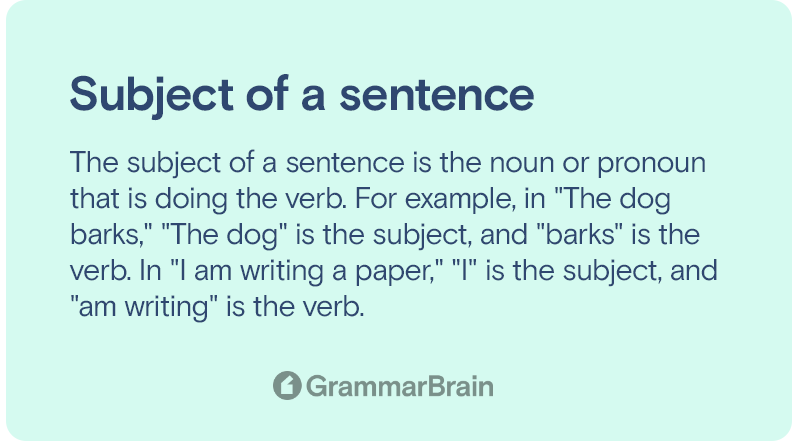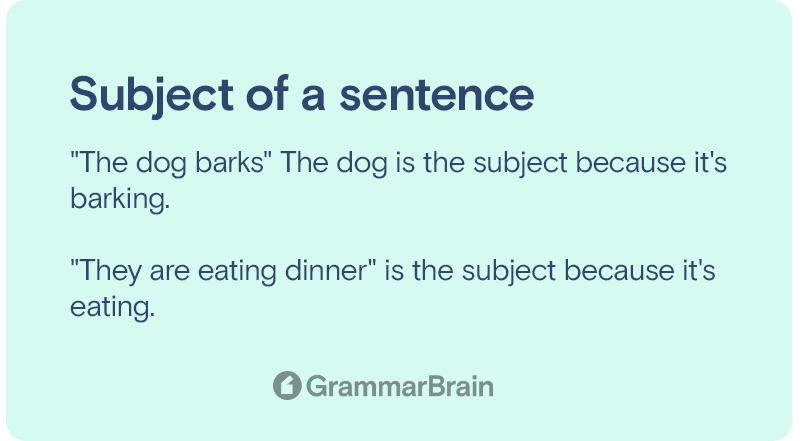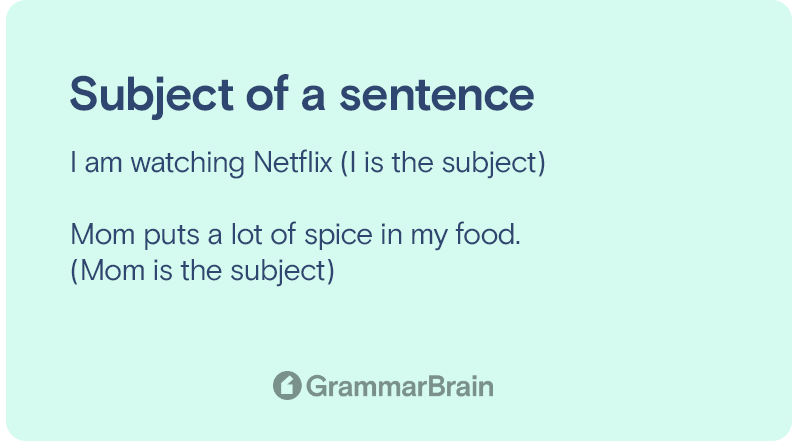What is the subject of a sentence? The subject of a sentence is an essential part of any communication. It can be the make or break of a great sentence. In this post, we’ll explore some examples of working with the subject of a sentence and how to use them to your advantage.

What is the subject of a sentence?
The subject of a sentence is the noun or pronoun that is doing the verb. For example, in “The dog barks,” “The dog” is the subject, and “barks” is the verb. In “I am writing a paper,” “I” is the subject, and “am writing” is the verb.
In English, it can be tricky to determine a sentence’s subject sometimes because so many words can act as verbs. However, there are some helpful ways to determine the subject of a sentence. A great way to determine the subject is to ask yourself who or what is doing the action.

Subject
The subject of a sentence is the noun or pronoun that is doing the verb. In the sentence “He kicked the ball,” He is the subject because it’s doing the kicking. The ball isn’t doing anything; it’s just there.
Subjects can be easy to find by asking who or what is doing the verb.
For example:
- “The dog barks” The dog is the subject because it’s barking.
- “They are eating dinner” is the subject because it’s eating.
- “It rained all day long” It is the subject because it’s raining.
A simple subject is one person or thing (one word) in addition toe the definite article or indefinite article (“a/an/the”).
A compound subject is two or more nouns or pronouns.
Predicate
The predicate is the verb in a sentence. It’s what the subject does. For example, “I am writing a book.” The verb is “am writing,” and the subject is “I.”
The predicate can also be used more broadly to mean anything that is said about the subject of a sentence.
For example, “The book is blue.” In this case, “blue” is not the verb but rather something that is being said about the book.
Direct Object
A direct object is a noun or pronoun that receives the verb’s action. In a sentence, it’s usually easy to spot the direct object because it will be followed by a verb and will always come after the indirect object. For example:
- “I donated my old clothes to charity.”
The direct object is “clothes,” and it receives the action of “donated.”
Indirect Object
An indirect object is a noun or pronoun that receives the direct object of a sentence. For example, in the sentence “Ramona gave her brother and sister a gift,” “a gift” is the direct object, while “brother and sister” are the indirect objects.
The reason for using an indirect object is to clarify the sentence’s meaning. In the example above, it’s unclear who received the gift until you learn that Ramona gave it to her brother and sister.
Subject Complement
A subject complement is a word or phrase that completes the meaning of the subject in a sentence. Usually, a noun or pronoun follows the verb and agrees in number (singular or plural) and gender (masculine, feminine, or neuter) with the subject.
The most common type of subject complement is a noun following the linking verb to be. For example: “The dog is a good hunter.” In this sentence, “hunter” is the subject complement, describing what kind of dog the speaker is talking about.

Examples of a subject of a sentence
- I am watching Netflix (I is the subject)
- Mom puts a lot of spice in my food. (Mom is the subject)
- They play cricket. (They are the subject)
- The employees or on a lunch break. (Employees are the subject)
- The boy from my class submitted an excellent project. (Boy from my class is the subject)
- John, Joe, and Jane are having lunch together. (John, Joe, and Jane are the subjects)
- The teacher appears to be rather busy. (Teacher is the subject)
How to find a subject of a sentence
To find the subject of a sentence, you need to identify the part of the sentence that is doing the action. In other words, you need to find the verb.
The subject is always a noun or pronoun and is always located before the verb. For example: “I am writing a paper.” “She is eating breakfast.” “I” and “she” are the subjects in both sentences.
Surrounding the subject of a sentence can be a prepositional phrase, linking verb, or predicate.
What is a complete sentence?
A complete sentence is a subject and predicate.
| Subject | Predicate |
| Tells who or what the sentence is about | Tells what the subject does |
| Examples: Mrs. Winter is our teacher. | Examples: Our cat was napping. |
FAQs
Can there be 2 subjects in a sentence?
Yes, there can be 2 subjects in a sentence. For example: “I and my friend went to the store.” or “He and I went to the store.”
When using pronouns, it’s important to remember that they must agree with their antecedents in number (singular or plural).
So if you have 2 subjects, make sure you use the correct pronoun for each one.
Do all sentences need a subject?
Yes, all complete sentences need a subject. A sentence without a subject is like a tree without roots – it won’t stand long against the wind.
Inside this article
Fact checked:
Content is rigorously reviewed by a team of qualified and experienced fact checkers. Fact checkers review articles for factual accuracy, relevance, and timeliness. Learn more.
Core lessons
Glossary
- Abstract Noun
- Accusative Case
- Anecdote
- Antonym
- Active Sentence
- Adverb
- Adjective
- Allegory
- Alliteration
- Adjective Clause
- Adjective Phrase
- Ampersand
- Anastrophe
- Adverbial Clause
- Appositive Phrase
- Clause
- Compound Adjective
- Complex Sentence
- Compound Words
- Compound Predicate
- Common Noun
- Comparative Adjective
- Comparative and Superlative
- Compound Noun
- Compound Subject
- Compound Sentence
- Copular Verb
- Collective Noun
- Colloquialism
- Conciseness
- Consonance
- Conditional
- Concrete Noun
- Conjunction
- Conjugation
- Conditional Sentence
- Comma Splice
- Correlative Conjunction
- Coordinating Conjunction
- Coordinate Adjective
- Cumulative Adjective
- Dative Case
- Determiner
- Declarative Sentence
- Declarative Statement
- Direct Object Pronoun
- Direct Object
- Diction
- Diphthong
- Dangling Modifier
- Demonstrative Pronoun
- Demonstrative Adjective
- Direct Characterization
- Definite Article
- Doublespeak
- False Dilemma Fallacy
- Future Perfect Progressive
- Future Simple
- Future Perfect Continuous
- Future Perfect
- First Conditional
- Irregular Adjective
- Irregular Verb
- Imperative Sentence
- Indefinite Article
- Intransitive Verb
- Introductory Phrase
- Indefinite Pronoun
- Indirect Characterization
- Interrogative Sentence
- Intensive Pronoun
- Inanimate Object
- Indefinite Tense
- Infinitive Phrase
- Interjection
- Intensifier
- Infinitive
- Indicative Mood
- Participle
- Parallelism
- Prepositional Phrase
- Past Simple Tense
- Past Continuous Tense
- Past Perfect Tense
- Past Progressive Tense
- Present Simple Tense
- Present Perfect Tense
- Personal Pronoun
- Personification
- Persuasive Writing
- Parallel Structure
- Phrasal Verb
- Predicate Adjective
- Predicate Nominative
- Phonetic Language
- Plural Noun
- Punctuation
- Punctuation Marks
- Preposition
- Preposition of Place
- Parts of Speech
- Possessive Adjective
- Possessive Determiner
- Possessive Case
- Possessive Noun
- Proper Adjective
- Proper Noun
- Present Participle
- Prefix
- Predicate



